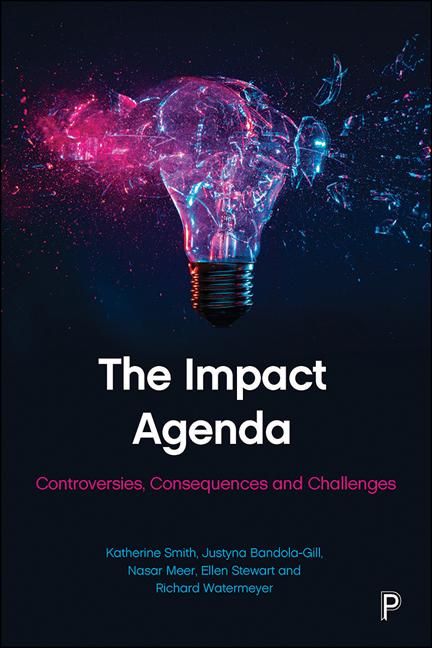Book contents
- Frontmatter
- Contents
- List of figures, tables and boxes
- List of abbreviations
- Notes on authors
- Acknowledgements
- 1 Introduction: Critical Reflections on Research Impact
- 2 The Rise of Research Impact
- 3 Debating the UK Impact Agenda
- 4 Do Experiences and Perceptions of Research Impact Vary by Discipline?
- 5 Impact on whom? Contrasting Research Impact with Public Engagement
- 6 Public Intellectualism and the Impact Agenda: International Perspectives
- 7 Academic Life in the Impact Vanguard: The View from Knowledge Exchange Organisations
- 8 Looking Back: Evolving Public Health Perspectives on Research Impact
- 9 Telling Tales of Impact: As Seen Through the Eyes of User Assessors
- 10 Conclusion: What Would an Evidence-Informed Impact Agenda Involve?
- References
- Index
4 - Do Experiences and Perceptions of Research Impact Vary by Discipline?
Published online by Cambridge University Press: 23 February 2021
- Frontmatter
- Contents
- List of figures, tables and boxes
- List of abbreviations
- Notes on authors
- Acknowledgements
- 1 Introduction: Critical Reflections on Research Impact
- 2 The Rise of Research Impact
- 3 Debating the UK Impact Agenda
- 4 Do Experiences and Perceptions of Research Impact Vary by Discipline?
- 5 Impact on whom? Contrasting Research Impact with Public Engagement
- 6 Public Intellectualism and the Impact Agenda: International Perspectives
- 7 Academic Life in the Impact Vanguard: The View from Knowledge Exchange Organisations
- 8 Looking Back: Evolving Public Health Perspectives on Research Impact
- 9 Telling Tales of Impact: As Seen Through the Eyes of User Assessors
- 10 Conclusion: What Would an Evidence-Informed Impact Agenda Involve?
- References
- Index
Summary
The understanding of any academic phenomenon would be incomplete without an exploration of its disciplinary character. Yet much of the existing published literature assessing the UK's approach to research impact focuses on single disciplines or areas of research (e.g. Dunlop, 2018; Greenhalgh and Fahy, 2015; Haux, 2018; Pettigrew, 2011; Watermeyer, 2014; Smith and Stewart, 2017), institutional research groups (Biri et al, 2014) or particular professions (e.g. Kelly et al, 2016; Marcella et al, 2018). In particular, there is a high number of studies relating to the research impact agenda that focus on health (Haux, 2018). Such a strong disciplinary bent in the existing analyses fails to capture, or allow comparative consideration of, the diverse ways in which impact and impact initiatives are experiences across different disciplines. This chapter starts to address this gap by focusing specifically on the role that disciplinary training, preferences and context appear to play in perceptions and experiences of the UK's impact agenda.
The limited existing literature that has explored experiences and perceptions of the UK's impact agenda across disciplines has reached mixed conclusions. A recent survey, which focused on research-active staff at a single UK institution (UWE), found only nuanced differences between academics based in different disciplines, concluding that ‘much can be shared and learned by and amongst researchers in different settings regarding impact best practice and its evidencing’ (Wilkinson, 2019: 83). In contrast, an interview-based study with academics in the UK and Australia found that disciplinary orientation can ‘dictate the type of activity associated with [impact]’ (Chubb, 2017: 22). For example, Chubb found that participants working in arts and the humanities emphasised the ‘public good’, a sense of the general value of research work, public engagement activities and cultural enrichment, while participants working in life and earth sciences emphasised policy impacts, practical improvements and working with industry, participants based in physical science, maths and engineering emphasised society, applied/useful research and an economic contributions, and, finally, participants in the social sciences stressed policy impacts, the direct use of research, societal change and broader engagement.
Another interview-based study with academics working in seven different disciplines in the UK found that ‘norms and traditions shared within disciplines, fields and modes of enquiry frame what can count as worthwhile “impacts” and as desirable or acceptable impact-oriented activities for individuals and groups’ (Oancea, 2013: 248).
- Type
- Chapter
- Information
- The Impact AgendaControversies, Consequences and Challenges, pp. 63 - 98Publisher: Bristol University PressPrint publication year: 2020

